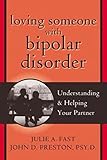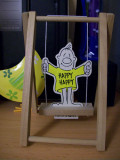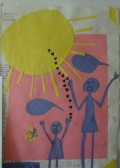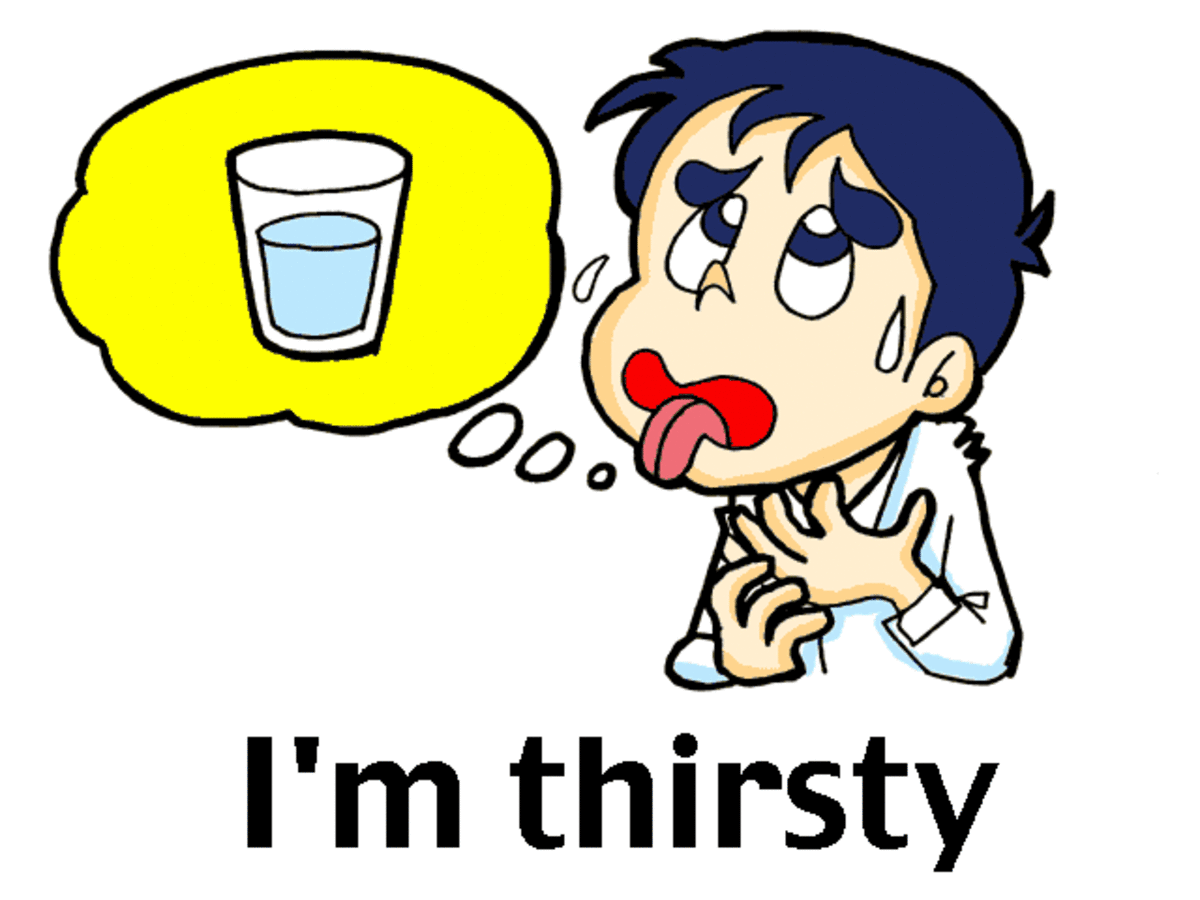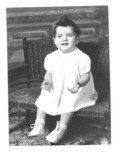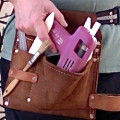Welcome To My Wild Mind - Bipolar Disorder
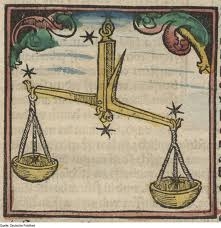
My Life With Bipolar Disorder
I'm having such a fantastic day! I'm home alone and the sun is shining through my open windows. I'm working hard on my most recent avocation - soap-making. My kitchen counters are covered in soap molds just waiting to hold the next batch I will pour. My kitchen table is full of various books and printouts, all with different recipes. My dining room table is covered with finished product - waiting to be wrapped and packaged.
My day speeds by, interrupted once by the mail carrier delivering lots of packages full of supplies and catalogs. Lots and lots of packages. Then, later, the UPS delivery comes, bringing even more packages - supplies, books, and all manner of related items. More packages. What have I ordered? Why don't I remember buying all these things?
A quick look around my living room reveals more boxes - many not even opened - randomly stacked around the room with narrow paths between them, just wide enough to walk through. Some piles look as if they'll fall over any minute. Against one wall is a trio of restaurant-sized baker's racks, stuffed with more molds and soap bases and colorings and fragrance bottles. And again - more mystery boxes.
Have I bitten off more than I can chew with all this craft stuff? Definitely. You see, I am bipolar and I am deep in the midst of a major manic episode.
(Graphic Source: FotothekBot)

What is Bipolar Disorder?
The Basic Facts
Bipolar disorder - alternately known as "manic-depression" - is a disorder of the brain. The disorder actually manifests as a group of mood disorders, usually with the presence of one or more "episodes" of mania - or abnormally high energy levels and mood. These episodes may or may not include one or more depressive episodes.
The highs of this disorder are known as mania or hypomania (a milder elevation). These highs are generally punctuated with depressive moods - or lows. There are even people who have "mixed" episodes, experiencing both mania and depression at the same time. And last, but certainly not least, there are the "normal" moods. It is in this "normal" state that people with bipolar disorder strive to spend most of their time!
Bipolar disorder is often difficult to diagnose because the symptoms may appear to be separate problems, not parts of one larger problem. In my case, I was originally diagnosed with panic and anxiety disorder. Only later, after suffering through the manic episode noted in the introduction, was I diagnosed as being bipolar.
Bipolar disorder is a disease, much like diabetes or heart disease, that I will need to deal with throughout my life. It cannot be cured, but can be managed. If not treated effectively, the disorder could easily destroy my life. It could cause me to damage my relationships with friends and family. It has affected my ability to hold and perform a job. And, worst of all, many people with bipolar disorder commit suicide in order to escape the psychological pain they experience.
The good news is, however, that bipolar disorder can be successfully treated and those afflicted can lead happy and successful lives. I feel fortunate to be in this category for the moment, but know that I must constantly monitor and be aware of my illness in order to stay happy and healthy.
Learn More About Bipolar Disorder - Knowledge is Power
There Are Ups
This is Mania
The main characteristic of bipolar disorder is of course Mania. Mania is the term that describes an elevated mood - a mood much more than just the "normal" high you might feel on a good day or after engaging in exercise or some activity you really enjoy.
While in a manic episode, you experience incredible bursts of energy and usually have a greatly decreased need for sleep. Some people, in fact, can go for days without sleeping! Additionally, a person in the grips of mania will often become much more talkative - sometimes talking almost non-stop, experience racing thoughts, and have a decreased attention span, becoming easily distracted. In mania, your judgment may be impaired, and you may find yourself indulging in spending sprees or engaging in other behaviors that are abnormal for you, such as abuse of drugs and/or alcohol. Some people experiencing many can begin to feel out of control or totally unstoppable - feeling that they've been "chosen" or are on a "special mission" of some sort.
During the manic phase I outlined in the introduction, I experienced many of these symptoms. Somehow I became interested in soap-making - something I knew nothing about. I started with internet research, then I went to a hobby store and bought a beginners kit. Then, my world started to spin out of control. My entire life became about making soap, and later rather grandiose ideas of selling the soaps I made. Within a very short period of time I was fully immersed in this activity and my actual job was starting to annoy me - it was taking me away from the soap.
I got into a pattern of going to work each day, doing the bare minimum required for me to keep my job, and spending the rest of the time on the internet reading about making soap. Then, I began to buy things over the internet - ingredients for soap, packaging materials, shrink wrap machines, soap molds, books about soap, you name it and I bought it.
I did so much online shopping that I memorized my credit card number, expiration date and security code. I could shop at the speed of light. I received a feeling of excitement and pleasure every time I bought something. And then, I would promptly forget what I bought and go on to buy more. That is why I would be so surprised when packages came to my house - I didn't remember buying all these things! Soon, very soon, all I was doing was sleeping and making soap, and I was sleeping less and less.
Then, during an appointment with the psychiatrist I was seeing about my panic/anxiety disorder, I brought up the soap-making. After questioning me in more detail, the doctor realized that I was in the grip of a full blown manic episode. It seems that a new medication I had been taking had the effect of bringing on mania in a person with bipolar disorder. I was bipolar.
To be diagnosed with mania, the Diagnostic and Statistical Manual of Mental Disorders (DSM), indicates that a person must experience this state mania and other symptoms for at least ae week. "Other" symptoms may include increased creativity, especially poor judgment and a higher than usual state of irritability. The mania may feel good to the person who experiences it. Also, the individual may not be able to recall the events that took place while they were experiencing mania.
After being prescribed a mood stabilizing medication, I came down from the manic high. It was both a shock and relief. Shock to see, for the first time, just how out-of-control I'd been. Relief to finally be "at rest" in my mind. Then, my husband and I set about picking up the pieces of our lives - with a house jam-packed with boxes and bottles and soap. With thousands and thousands of dollars in credit card debt. We had to rent a storage space just to get all the materials out of the house so that we could walk around. Years later we're still selling off inventory.
There Are Downs
This is Depression
Following the mania comes the depression. The symptoms of this phase of bipolar disorder may include:
- overwhelming feelings of sadness
- anger
- isolation
- anxiety
- guilt
- hopelessness
- disturbances in sleep and appetite
- overwhelming fatigue
- loss of interest in previously enjoyed activities
- problems with concentration
- apathy
- loneliness
- indifference
- shyness or social anxiety
- irritability
- chronic pain
- lack of motivation
- thoughts of suicide
About six months after my manic episode, I began to feel depressed. Within a short period of time I found myself in a very deep depressive state. I was so very tired, but either could not sleep or I slept all the time but did not feel refreshed afterward. I had all the symptoms noted in the paragraph above. I began to contemplate suicide. Every day I would come up with a new or better way to kill myself, thereby putting an end to the pain I felt.
Fortunately, my husband got me to my doctor and she was able to prescribe an anti-depressant that, after a few anxious days, put me on the path to recovery. . This was, however, a very tricky time. How much medication could I take, and what type, to keep me out of depression but not push me into mania? After months of trial and error we arrived at a combination that seemed to do the trick. For the time being, anyway.
I learned that this is the tricky line those of us with bipolar disorder must walk. How to feel good without feeling too good. How to feel bad without feeling too bad. Over the years I have been on many medications at many doses. As my body and my circumstances change, certain medications or dosages no longer work. My husband and I must be constantly vigilant to any changes which might signal a spiral downward or a leap into mania. It is not always easy, but it's do-able.
More About BPD with Dr. Kaye Jamison - A Fellow Suffere of BIpolar Disorder
Do You Know Anyone With Bipolar Disorder?


